From the Open-Publishing Calendar
From the Open-Publishing Newswire
Indybay Feature
World Farm Animals Day at KFC in Santa Cruz
On Sunday October 2, I met up with The Progressive Animal Rights Alliance of Santa Cruz at the Food Bin on Mission St. in Santa Cruz. We marched a few blocks to the KFC on Mission St. to call attention to KFC's cruelty to animals.
Listen now:
The Progressive Animal Rights Alliance of Santa Cruz works to reduce suffering among both human and non-human animals, with the primary goal of educating people about the cruelty inherent in the many commonly-accepted ways animals are exploited and abused in our society.
Internationally, People for the Ethical Treatment of Animals (PETA) has a campain website called KentuckyFriedCruelty.com asking KFC to eliminate the worst abuses that chickens suffer on the factory farms and in the slaughterhouses of its suppliers, including live scalding, life-long crippling, and painful debeaking.
There were about a dozen people at the demonstration on Mission St. in Santa Cruz on October 2, World Farm Animals Day, to protest KFC. Mission St. is also Highway 1 and there were a lot of people that honked in support of the demonstration. Informational flyers were passed out to passing motorists, as well as customers who were both entering and leaving KFC. This particular demonstration lasted about an hour, and by the time we left, there were only two customers in the restaurant.
At one point, I was standing on the sidewalk and looking inside the KFC when an employee, shown below sitting with a red shirt at a table, flipped me the bird - you know, gave me the middle finger. I was quite amused by this so I walked up to her and asked her if she wanted to do that again for the camera. She declined and told me she was going to sue me.
But I have to say, the KFC employee of the day award goes to the manager for running after me and kicking me in the upper thigh. It is too bad that Amy, a film student at Brooks Institute of Photography in Santa Barbara, had stopped filming just seconds prior to him kicking me. However, for what it's worth, she recorded a statement saying that she witnessed the manager kick me. You can listen to the audio file called "amy_10-2-05.mp3" below and see a photo of the manager running just before kicking me.
Internationally, People for the Ethical Treatment of Animals (PETA) has a campain website called KentuckyFriedCruelty.com asking KFC to eliminate the worst abuses that chickens suffer on the factory farms and in the slaughterhouses of its suppliers, including live scalding, life-long crippling, and painful debeaking.
There were about a dozen people at the demonstration on Mission St. in Santa Cruz on October 2, World Farm Animals Day, to protest KFC. Mission St. is also Highway 1 and there were a lot of people that honked in support of the demonstration. Informational flyers were passed out to passing motorists, as well as customers who were both entering and leaving KFC. This particular demonstration lasted about an hour, and by the time we left, there were only two customers in the restaurant.
At one point, I was standing on the sidewalk and looking inside the KFC when an employee, shown below sitting with a red shirt at a table, flipped me the bird - you know, gave me the middle finger. I was quite amused by this so I walked up to her and asked her if she wanted to do that again for the camera. She declined and told me she was going to sue me.
But I have to say, the KFC employee of the day award goes to the manager for running after me and kicking me in the upper thigh. It is too bad that Amy, a film student at Brooks Institute of Photography in Santa Barbara, had stopped filming just seconds prior to him kicking me. However, for what it's worth, she recorded a statement saying that she witnessed the manager kick me. You can listen to the audio file called "amy_10-2-05.mp3" below and see a photo of the manager running just before kicking me.
Listen now:
Listen now:
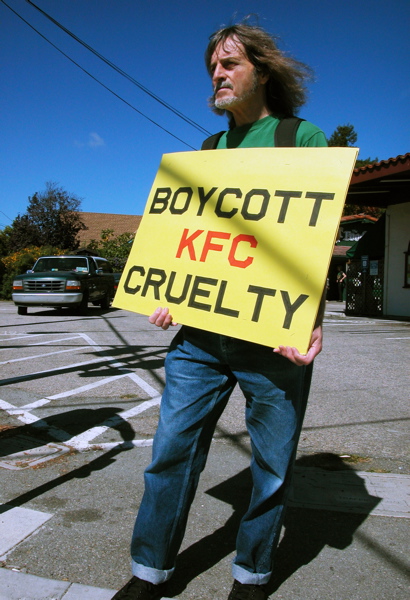
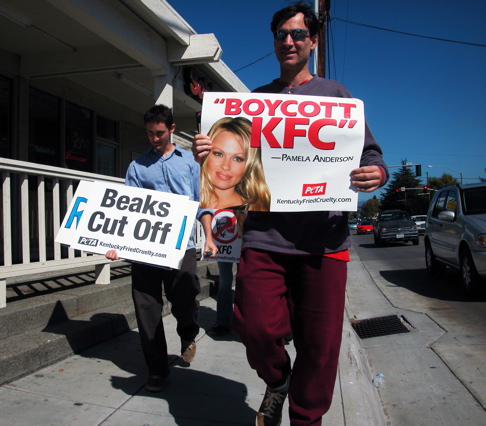
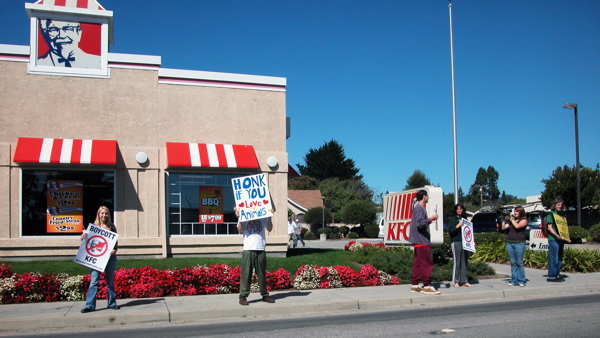
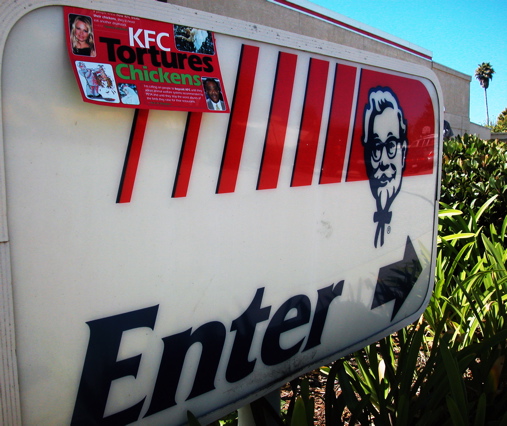
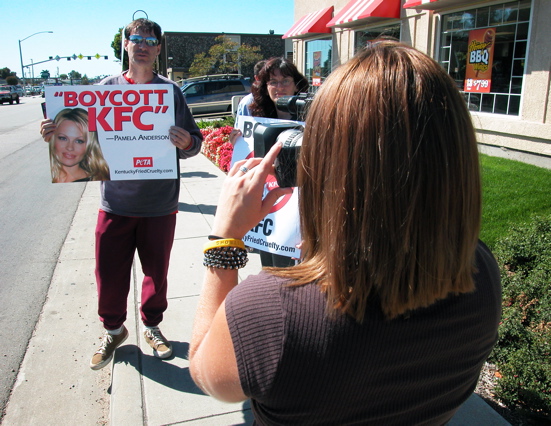
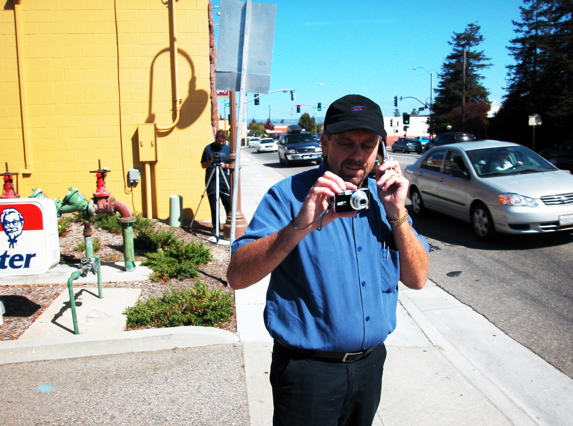
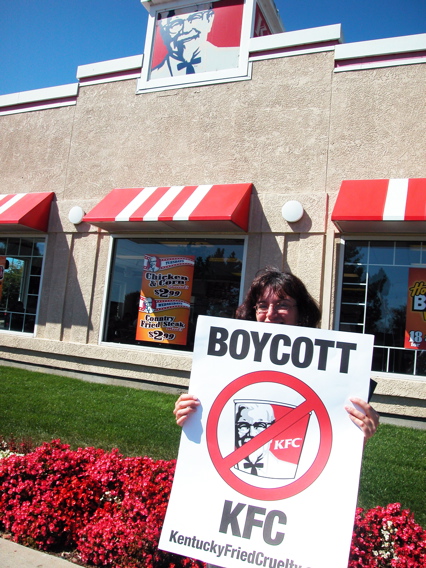
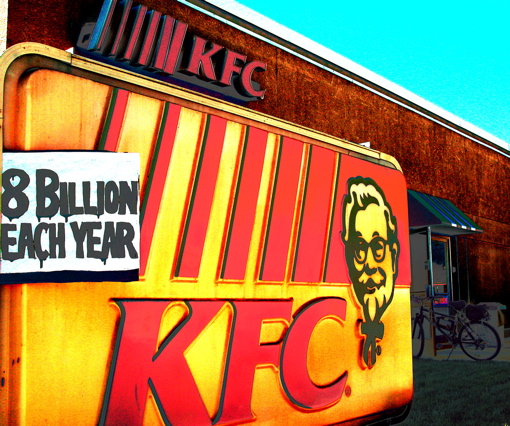
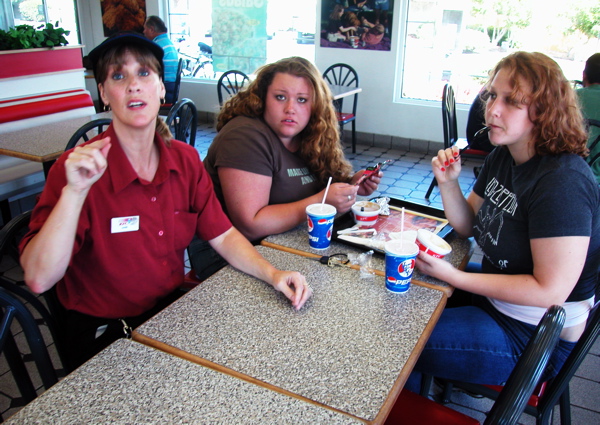
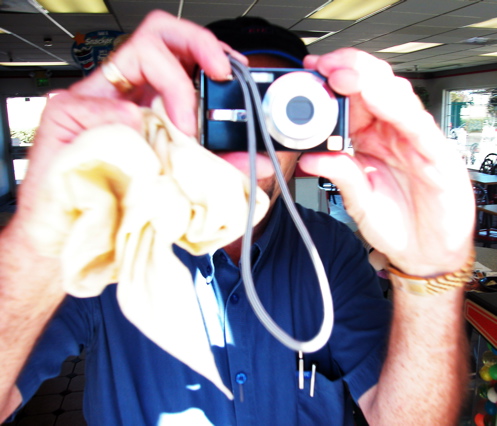
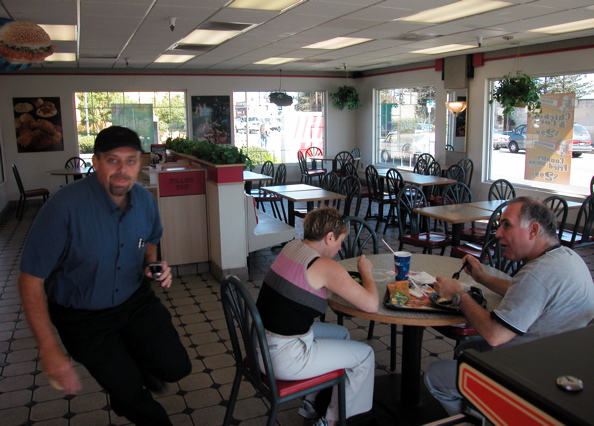
Add Your Comments
Comments
(Hide Comments)
when I was 16, all the teachers were telling us that it was important to get a part time job, you would have no job experience and wouldn't be able to be hired when you were 18 or 19, plus classmates were always talking about their $6 afterschool job which allowed them to get a car and clothes, even though it sucked up 20 hrs/week during high school. So I applied at KFC but they turned me down, so I had all this time to get ahead in school.
This was a comment on the recent article about avian flu and the risk of antibiotic reistant viruses being spread in factory farms from overuse of antibiotics..
The effects of overcrowded chickens in factory farms is now evident. While the corporate spin media is placing blame on small backyard farmers who raise & handfed chickens with love and migratory waterfowl like ducks and geese as vectors (transmitters of disease), the reality is that poultry factory farms are increasing illness in chickens from overuse of antibiotics (wears down immune system of birds while simultaneously increasing resistence of pathogens like virus/bacteria) and crowded conditions speeding rates of transmissions..
"The unregulated, widespread use of antibiotics in animals has led to bacteria that are resistant to older drugs such as penicillin and tetracycline, making them less effective in treating sick humans."
http://www.organicconsumers.org/Toxic/mcdonalds_antibiotics.cfm
"Life is no picnic for chickens either. Industrial agriculture is continually looking for ways to increase production of chickens, whether they are produced for their eggs or for their meat. One way of increasing production is by increasing the amount of birds in the building or structure. Thousands of birds are stuffed in buildings, never able to see the sun or feel the earth beneath their feet, so cramped together they can scarcely move. "The hens incessantly strike out in frustration — pecking at the only thing available: each other," according to Bradley Miller, the national director of the Humane Farming Association (HFA). The birds are forced to undergo a painful procedure called debeaking in order to stop damage to the chickens that could cost farmers money, according to Miller. The hen's upper beak is cut off with a hot blade, without anesthetic. Debeaked birds still peck at each other, but they do not cause as much economic damage.
Okay, no beef, pork, or chicken. You'll be a lacto-ovo vegetarian. There's nothing like "the incredible, edible egg." Any problems there?
Well, some. The egg industry, which has seen some success in its efforts to promote egg consumption, is now trying to increase production. One way to increasing egg production is through forced molting, known in the industry as "recycling." Here's how it's done. Feed is taken away for days, or perhaps weeks, depending on the farm. Chickens lose their feathers. After the chickens molt, they begin producing eggs again. Obviously, not all chickens survive this process. But the monetary cost of a few dead chickens is nothing to the farmer compared to the money gained from the increased egg production.
Unfortunately, forced molting also is unhealthy to humans. A study on forced molting procedures published in Poultry Science, stated that "feed removal substantially increased the susceptibility of hens to an SE (Salmonella enteritidis) infection." In one of the experiments "SE was recovered from five eggs, each from a different hen....All of the isolations were from molted hens." Of course, contaminated eggs or poultry can then spread salmonella to humans.
The Threat of
Antibiotic Resistance
To reduce the incidence of infection due to forced molting, close quarters (and the resultant manure overload), and pecking injuries, most birds are pumped full of antibiotics. Many of us have heard in the news the growing resistance of people to certain antibiotics. Many are not aware that the food we eat is contributing to this problem. "Animal husbandry is a driving force for the development of antibiotic resistance in certain pathogenic bacterial species," according to Wolfgang Witte, in the journal Science. This is true for a couple of reasons. First, some of the diseases antibiotics are being used to treat in farm animals are the same diseases humans can become infected with, such as salmonella, campylobacter, and E. coli. Another reason for the growing resistance is that some of the antibiotics given to farm animals are extremely similar to ones given to humans. Avoparcin, which is placed in animals' feed, is similar to vancomycin, which is a human medication. "Vancomycin and avoparcin have the same mode of action; resistance to one confers resistance to the other," according to Witte. The American Society for Microbiology "estimates that drug-resistant pathogens cost more than $4 billion per year in extra medical costs in the United States alone." This figure does not take into account the cost of human lives from people dying from antibiotic-resistant infections."
http://www.consciouschoice.com/1999/cc1205/industrialagriculture.html
Antibiotics are better used in crisis situations, not on a daily basis as practiced by the poultry corporations in their factory farms. Unfortunately the effects of antibiotic overuse often effect the weakest and most vulnerable members of society. After an epidemic with a newer resistant strain of a virus or bacteria, the people with the weakest immune systems don't survive or are more greatly effected. This is usually the lower income, elderly and other people who are unable to maintain a healthy lifestyle for various reasons, including affordability and availability of healthy foods. We are putting the lives of many people and other animals at risk by continuously allowing poultry corporations to overuse antibiotics to increase their profit from factory farmed chickens..
Small backyard poultry farmers and migratory waterfowl may be the solution to the resistant virus epidemic caused by corporate poultry antibiotic addictions for profit. People who desire to eat poultry birds can befriend a neighborhood poultry farmer, raise their own chickens or participate in waterfowl restoration and learn archery. Birds raised with love at home or who died living free lives in the wild would taste better also. Please don't sell yourself short on corporate myths, factory farming doesn't provide health or nutrition, only sadness and sickness. What it comes down to is people taking matters in their own hands and preventing corporate poultry factory farms from making everyone sick..
luna moth
PS To all vegans and vegetarians i'm not promoting hunting as an alternative, though i feel both hunting and raising poultry in your home is a safer, healthier, more humane and sustainable method for those humans who continue to eat poultry. If we restored some central valley wetlands there would be more food for migratory waterfowl and edible native plants for non-meat eaters. Either way we can all agree that factory farms gots to go!!
The effects of overcrowded chickens in factory farms is now evident. While the corporate spin media is placing blame on small backyard farmers who raise & handfed chickens with love and migratory waterfowl like ducks and geese as vectors (transmitters of disease), the reality is that poultry factory farms are increasing illness in chickens from overuse of antibiotics (wears down immune system of birds while simultaneously increasing resistence of pathogens like virus/bacteria) and crowded conditions speeding rates of transmissions..
"The unregulated, widespread use of antibiotics in animals has led to bacteria that are resistant to older drugs such as penicillin and tetracycline, making them less effective in treating sick humans."
http://www.organicconsumers.org/Toxic/mcdonalds_antibiotics.cfm
"Life is no picnic for chickens either. Industrial agriculture is continually looking for ways to increase production of chickens, whether they are produced for their eggs or for their meat. One way of increasing production is by increasing the amount of birds in the building or structure. Thousands of birds are stuffed in buildings, never able to see the sun or feel the earth beneath their feet, so cramped together they can scarcely move. "The hens incessantly strike out in frustration — pecking at the only thing available: each other," according to Bradley Miller, the national director of the Humane Farming Association (HFA). The birds are forced to undergo a painful procedure called debeaking in order to stop damage to the chickens that could cost farmers money, according to Miller. The hen's upper beak is cut off with a hot blade, without anesthetic. Debeaked birds still peck at each other, but they do not cause as much economic damage.
Okay, no beef, pork, or chicken. You'll be a lacto-ovo vegetarian. There's nothing like "the incredible, edible egg." Any problems there?
Well, some. The egg industry, which has seen some success in its efforts to promote egg consumption, is now trying to increase production. One way to increasing egg production is through forced molting, known in the industry as "recycling." Here's how it's done. Feed is taken away for days, or perhaps weeks, depending on the farm. Chickens lose their feathers. After the chickens molt, they begin producing eggs again. Obviously, not all chickens survive this process. But the monetary cost of a few dead chickens is nothing to the farmer compared to the money gained from the increased egg production.
Unfortunately, forced molting also is unhealthy to humans. A study on forced molting procedures published in Poultry Science, stated that "feed removal substantially increased the susceptibility of hens to an SE (Salmonella enteritidis) infection." In one of the experiments "SE was recovered from five eggs, each from a different hen....All of the isolations were from molted hens." Of course, contaminated eggs or poultry can then spread salmonella to humans.
The Threat of
Antibiotic Resistance
To reduce the incidence of infection due to forced molting, close quarters (and the resultant manure overload), and pecking injuries, most birds are pumped full of antibiotics. Many of us have heard in the news the growing resistance of people to certain antibiotics. Many are not aware that the food we eat is contributing to this problem. "Animal husbandry is a driving force for the development of antibiotic resistance in certain pathogenic bacterial species," according to Wolfgang Witte, in the journal Science. This is true for a couple of reasons. First, some of the diseases antibiotics are being used to treat in farm animals are the same diseases humans can become infected with, such as salmonella, campylobacter, and E. coli. Another reason for the growing resistance is that some of the antibiotics given to farm animals are extremely similar to ones given to humans. Avoparcin, which is placed in animals' feed, is similar to vancomycin, which is a human medication. "Vancomycin and avoparcin have the same mode of action; resistance to one confers resistance to the other," according to Witte. The American Society for Microbiology "estimates that drug-resistant pathogens cost more than $4 billion per year in extra medical costs in the United States alone." This figure does not take into account the cost of human lives from people dying from antibiotic-resistant infections."
http://www.consciouschoice.com/1999/cc1205/industrialagriculture.html
Antibiotics are better used in crisis situations, not on a daily basis as practiced by the poultry corporations in their factory farms. Unfortunately the effects of antibiotic overuse often effect the weakest and most vulnerable members of society. After an epidemic with a newer resistant strain of a virus or bacteria, the people with the weakest immune systems don't survive or are more greatly effected. This is usually the lower income, elderly and other people who are unable to maintain a healthy lifestyle for various reasons, including affordability and availability of healthy foods. We are putting the lives of many people and other animals at risk by continuously allowing poultry corporations to overuse antibiotics to increase their profit from factory farmed chickens..
Small backyard poultry farmers and migratory waterfowl may be the solution to the resistant virus epidemic caused by corporate poultry antibiotic addictions for profit. People who desire to eat poultry birds can befriend a neighborhood poultry farmer, raise their own chickens or participate in waterfowl restoration and learn archery. Birds raised with love at home or who died living free lives in the wild would taste better also. Please don't sell yourself short on corporate myths, factory farming doesn't provide health or nutrition, only sadness and sickness. What it comes down to is people taking matters in their own hands and preventing corporate poultry factory farms from making everyone sick..
luna moth
PS To all vegans and vegetarians i'm not promoting hunting as an alternative, though i feel both hunting and raising poultry in your home is a safer, healthier, more humane and sustainable method for those humans who continue to eat poultry. If we restored some central valley wetlands there would be more food for migratory waterfowl and edible native plants for non-meat eaters. Either way we can all agree that factory farms gots to go!!
We are 100% volunteer and depend on your participation to sustain our efforts!
Get Involved
If you'd like to help with maintaining or developing the website, contact us.
Publish
Publish your stories and upcoming events on Indybay.
Topics
More
Search Indybay's Archives
Advanced Search
►
▼
IMC Network


